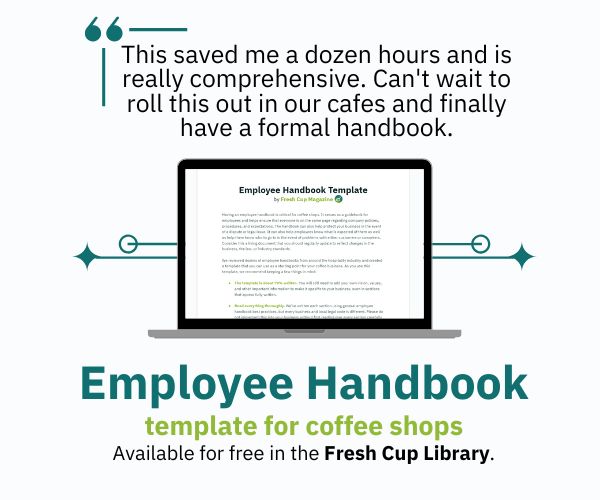Does anyone want to buy my Starbucks NFT? Plus, coffee production in Brazil is up, the SCA investigates how value is distributed across the supply chain, and yet another clever use for spent coffee grounds.
‘Brazil Heading to Rare Sequence of Rising Coffee Crops’ – via Reuters
In 2024, analysts expect coffee production in Brazil to grow by 5% from the year prior. For the third year in a row, Brazilian coffee production has steadily increased—something that, as Reuters reports, has happened “only seven times in 144 years of coffee history in the world’s largest grower and exporter.”
Brazilian coffee harvests usually ebb and flow: one year, the amount of coffee cherries harvested will go up, and the following year, they’ll dip. That’s because Brazil is the world’s largest producer of arabica coffee, and arabica plants tend to run on a biennial cycle where, if a plant has a productive season, it’ll likely produce less the following year.
However, drought and frost hit the country in 2020 and 2021, breaking the cycle. After those climate events, many producers implemented techniques such as pruning trees and irrigation systems to better cope with dry weather. Along with many farmers shifting towards robusta production—which doesn’t have the same production swing as arabica—coffee yields are trending upward.
And there’s a chance this upswing trend will continue. “The growth is a reality. … No doubt next year’s crop will be larger as well, taking this sequence of increases to four years,” Marcio Ferreira, president of the Brazilian exporting group Cecafe, told Reuters.
Global demand and supply constraints have driven robusta prices to record highs. Robusta plants are climate resilient and yield more coffee cherries per plant, making them a more attractive prospect for some farmers than fragile arabica. “At some point, Brazil will likely produce more robusta beans than Vietnam,” said coffee analyst Fernando Maximiliano. Vietnam is currently the world’s largest robusta grower but faces issues with erratic weather patterns and competition from other crops.
‘SCA Mines the Coffee Industry’s Mindset On Value Distribution’ – via Daily Coffee News
The Specialty Coffee Association (SCA) has released a report exploring the findings from its 2023 survey investigating equitable value distribution in the industry.
Key findings include that “the majority of respondents believe that value should be distributed differently than it currently is.” The report also found that respondents “believe supply-side actors—especially producers—receive a proportionally low share of coffee’s total value in comparison to the value they create.”
Basically, the report reveals that respondents believe that farmers are not reaping the value of coffee proportionate to the amount of value their work gives coffee. “Respondents believe that more value is created by actors upstream (closer to and including producers),” the report reads, “while more value is distributed to actors downstream.”
The survey included reports from 406 respondents across the coffee supply chain, most of whom were business owners, senior executives, roasters, and managers. To supplement the survey, the SCA also organized a focus group of 16 coffee producers in Guatemala.
If you’re plugged into the coffee world, these results are likely not surprising, which the SCA acknowledges. Instead, according to an SCA press release, the survey is meant to serve “as a baseline against which to measure the effectiveness of future activities undertaken by the association and its stakeholders to ensure the equitable distribution of value across the sector.”
SCA Sustainability Director Andrés Montenegro told Daily Coffee News that the survey results will help guide the association’s next steps. “This will be an ongoing conversation. We’re not expecting something that has not been solved in four decades to be solved because we released this report.”
‘Starbucks is Shutting Down Its NFT Rewards Program’ – via Mashable
Who remembers Starbucks’ NFT rewards program, Odyssey?
Who remembers what NFTs even are?
It doesn’t matter now because Starbucks is shutting the program down before it even left the beta testing phase.
The Odyssey program, which launched at the end of 2022, rewarded customers with points that could be redeemed for Starbucks’ version of non-fungible tokens, unique blockchain-based digital objects. These tokens could eventually be translated into real-world experiences, from classes or special events to visits to Starbucks’ farm in Costa Rica. Customers could also purchase Journey Stamps, as the company referred to its tokens, to accumulate more points and earn rewards faster.
However, as Engadget notes, Starbucks was a latecomer to the NFT craze, which peaked in 2021 and fizzled out the following year. The vast majority of the tokens are now worthless. Starbucks’ launch was actually quite popular, with the first batch selling out in minutes. A secondary market proved lucrative, as tokens that initially sold for $100 changed hands for upwards of $2,000.
Then-CEO Howard Schultz announced Odyssey’s launch during an anti-union tour, using NFTs to “excite [workers] about a union-less future with the company,” according to Mashable. Although the program is ending, “Starbucks says users can continue to hold them, trade them, and buy or sell them on the Nifty Gateway NFT marketplace.”
More News
‘Frank La Of Be Bright Coffee Wins The 2024 US Barista Championship‘ – via Sprudge
‘First ‘Golden Attribute Competition’ Celebrates Flavors of Nicaraguan Coffees‘ – via Daily Coffee News
‘Learn De-Escalation Techniques in this Virtual Class with Laila Ghambari‘ – via Fresh Cup Magazine
‘Costa Rica Exports First Certified Deforestation-Free Coffee to Europe’ – via Tico Times
‘BLK & Bold Founders Launch Nonprofit to Expand Youth Impact‘ – via Daily Coffee News
‘Compass Coffee Makes a Bold Move By Accepting Cryptocurrency in D.C.‘ – via Eater DC
‘EU Delays Stricter Rules on Imports from Deforested Areas‘ – via Financial Times
‘Solidaridad’s Small Farmer Atlas Navigates the Perspectives of Farmers’ – via Daily Coffee News
‘Registration Open for World of Coffee Busan 2024‘ – via Global Coffee Report
‘With RI5, Cropster Updates Signature Roast Profiling System‘ – via Daily Coffee News
The Week in Coffee Unionizing
- The collective bargaining process for Starbucks’ 400 unionized stores will begin in April. In March, both sides announced a breakthrough in negotiations, ending a nearly two-and-a-half-year stalemate on bargaining. These first bargaining sessions are meant to create a framework for further talks, and individual stores must ratify any agreements made during the meetings. Each unionized location will have its own delegate, although it is unclear how many will participate in the talks. “We remain committed to charting a new path forward with Starbucks and are making progress on bargaining details,” the union said.
- Nine more Starbucks stores filed to hold union elections this week, bringing the number of filings to more than 500 nationwide. In a letter to CEO Laxman Narasimhan, workers wrote that “even though we work in different stores and states, we are all united through shared experiences and in our demand for fair and consistent scheduling … We’re excited about the announcement of a new path forward between Starbucks and the union and look forward to forging a productive relationship based on mutual respect.”
Is Coffee Good For You?
Spent coffee grounds can help remove a toxic herbicide from drinking water. Researchers in Brazil used zinc chloride to activate the carbon in spent coffee grounds, which they used to soak up bentazone from aqueous solutions.
Bentazone is a chemical herbicide used in agriculture, primarily on crops like soybeans and corn. It is considered “highly neurotoxic.”
Ingesting the chemical can cause vomiting, diarrhea, difficulty breathing, and even death. Soil leaching and runoff can cause water contamination, and the Environmental Protection Agency notes that bentazone “exceeds levels of concern for ground water quality.”
According to the researchers, “Currently, the contamination of groundwater and surface water is one of the most pressing environmental problems—the biggest challenge of this century is to prevent water pollution.”
The study, published in the Journal of Chemical Technology and Biotechnology, found that activated carbon was 70% efficient in filtering bentazone from the sample. After filtration, the sample “no longer caused toxicity to the test system, and the results obtained were similar to the control with distilled water.”
We throw away a lot of coffee grounds—somewhere between six and 15 million tons go into landfills each year—so it’s good to know scientists are looking for alternative uses for the stuff. Now, we can add “chemical cleanup” to the list of possibilities alongside concrete, biofuel, livestock feed, and, of course, luxury watches.
Beyond the Headlines
‘Coffee at Sea’ by Fionn Pooler
‘Rebranding Russian Tea and Coffee’ by Eugene Gerden
‘Chai, Chai Tea Lattes, And A Home Away From Home’ by Navdeep Kaur















